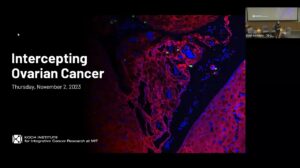NEW YORK (Reuters Health) – A European study indicates that patients with T-cell prolymphocytic leukemia may respond well to induction chemotherapy using fludarabine, mitoxantrone and cyclophosphamide, followed by consolidation with alemtuzumab.
However, despite a high overall response rate, the researchers found that “the duration of remission and the median OS (overall survival) of 17.1 months still remain just marginally better than in comparable series.”
The authors of the report in the March 19 online issue of Cancer explain that T-cell prolymphocytic leukemia (T-PLL) is markedly resistant to conventional chemotherapy, and less than 5% of patients survive 5 years. While there is a need for novel treatments, data from systematic trials are scarce.
Alemtuzumab is considered the most active single agent against T-PLL, they continue, and the current phase II trial investigated whether combining alemtuzumab with the best available chemotherapy regimen adds benefit.
Dr. Georg Hopfinger, at Paracelsus Medical University in Salzburg, Austria, and colleagues treated 25 T-PLL patients with fludarabine, mitoxantrone and cyclophosphamide (FMC) for a median of four cycles. Then, 21 of the patients went on to receive alemtuzumab for 2 to 14 weeks.
FMC induction produced 6 complete remissions and 11 partial remissions, for an overall response rate of 68%, the team found. Alemtuzumab consolidation then increased the intent-to-treat overall response rate to 23 of 25 patients (92%).
Median progression-free survival for all 25 patients was 11.9 months, and remained the same when the four patients who did not receive alemtuzumab were excluded, according to the report. As mentioned, median overall survival was 17.1 months.
Regarding safety, hematological toxicities were common. Furthermore, among the patients treated with alemtuzumab, there were 13 instances of reactivation of cytomegalovirus infection, the investigators noted.
Discussing the results, Dr. Hopfinger and colleagues say the response rate they documented is encouraging, but “it remains a concern that the majority of patients eventually relapse, regardless of the quality of response.”
Based on their study and other data, they conclude, “The median duration of a response after alemtuzumab with or without chemotherapy can currently be estimated to be less than 1 year. This urgently calls for more efficient first-line strategies as well as for improved consolidation.”
SOURCE: Sequential chemoimmunotherapy of fludarabine, mitoxantrone, and cyclophosphamide induction followed by alemtuzumab consolidation is effective in T-cell prolymphocytic leukemia
Cancer 2013.




